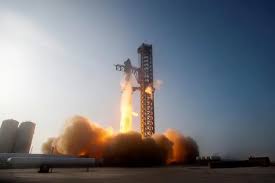SpaceX Awaits Regulatory Breakthrough Following April Rocket Mishap
SpaceX’s Regulatory Journey: Aiming for October Milestone
SpaceX, the visionary aerospace company led by Elon Musk, is on the verge of a significant regulatory achievement. After a major setback in April involving a Falcon 9 rocket explosion during a test flight, SpaceX has been diligently working to regain its standing. Here’s the latest on SpaceX’s quest for an upgraded launch license.
SpaceX’s Pursuit of an Enhanced Launch License
Recent developments indicate that SpaceX’s efforts to secure an upgraded launch license may yield positive results as early as October. The April incident, which unfolded during a Crew Dragon capsule test flight at SpaceX’s Texas facility, resulted in the rocket’s destruction.
Fortunately, there were no casualties, but the incident prompted a thorough review of the company’s safety protocols and procedures. The explosion also raised concerns at the Federal Aviation Administration (FAA), responsible for overseeing commercial space launches in the United States.

FAA’s Reassessment and Upgraded License
SpaceX had been operating under a license that granted certain privileges for its rocket launches. However, the April mishap prompted the FAA to reevaluate and potentially enhance SpaceX’s license to ensure maximum safety. If approved, the new license would expand SpaceX’s capabilities and provide greater flexibility for future missions.
Insiders at the FAA have indicated their active collaboration with SpaceX to expedite the review process. While no official timeline has been confirmed, there is optimism that the upgraded license could be granted by October, contingent on SpaceX meeting all safety and regulatory requisites.
Implications of an Enhanced License
The potential approval of an upgraded license holds profound significance for SpaceX. It would empower the company to sustain its ambitious launch schedule, encompassing crewed missions to the International Space Station (ISS), satellite deployments, and even missions to Mars.
Post the April incident, SpaceX has implemented substantial safety enhancements and executed successful launches, including the groundbreaking Inspiration4 mission, which transported an all-civilian crew to orbit. These endeavors underscore SpaceX’s unwavering commitment to safety and reliability, further bolstering the case for a license upgrade.
As October draws near, space enthusiasts and industry observers eagerly await the FAA’s decision, which could herald an exciting new chapter in SpaceX’s cosmic exploration journey.
FAQs About SpaceX License Advancement Possible As Early As October Following April Rocket Explosion
Q1: Why does SpaceX need an upgraded launch license?
A1: SpaceX is pursuing an upgraded launch license to expand its capabilities and flexibility after a rocket incident prompted safety concerns.
Q2: When did the rocket incident occur, and what were the consequences?
A2: The rocket incident happened in April during a Crew Dragon test flight, resulting in the rocket’s destruction. Thankfully, no casualties were reported.
Q3: What is the role of the FAA in this process?
A3: The FAA oversees commercial space launches in the United States and is reassessing SpaceX’s license to ensure safety.
Q4: What activities could SpaceX undertake with an enhanced license?
A4: An upgraded license would allow SpaceX to conduct a wider range of activities, including crewed missions to the ISS, satellite deployments, and missions to Mars.
Q5: How has SpaceX demonstrated its commitment to safety?
A5: SpaceX has made substantial safety improvements and executed successful launches, such as the Inspiration4 mission, showcasing its dedication to safety and reliability.



